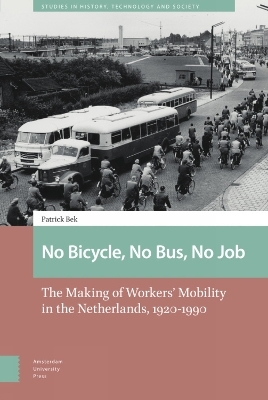
No Bicycle, No Bus, No Job
Amsterdam University Press (Verlag)
978-94-6372-318-3 (ISBN)
Patrick Bek is a historian who received his PhD in 2021 from Eindhoven University of Technology. His research interests include labor history, history of technology, and mobility studies. He currently lectures at Rotterdam University of Applied Sciences.
Acknowledgements
Figures
Introduction
How Workers’ Travel was Controlled in Many Ways
Mobility in Key Dutch Industrial Centers
Grasping the Worker’s Perspective of Mobility
1 Responding to the Transport Mismatch, 1920-1940
1.1 Transport Mismatch between Home and Work
1.2 Workers Seek Mobility Alternatives
Conclusion
2 Protesting Bus Regulations during the Depression, 1926-1938
2.1 State Regulation of Passenger Buses
2.2 Workers Respond with a Miner Bus Boycott
Conclusion
3 Mobility Austerity during War and Scarcity, 1940-1947
3.1 Wartime Transport Mismatch
3.2 Wartime Mobility Austerity
3.3 Scarcity and Austerity Continue After the War
Conclusion
4 Mobility Barriers during Postwar Industrialization, 1947-1970
4.1 Lack of Affordable Housing Near Jobs
4.2 Public Transit Falls Short
Conclusion
5 Postwar Mobility Practices, 1947-1970
5.1 Urban and Peri-Urban Workers Keep on Cycling and Discover Mopeds
5.2 Company Buses for Rural and Migrant Workers
Conclusion
6 Disciplining Cyclists and Moped Riders
6.1 Companies Fear for Workers’ Safety in Postwar Traffic
6.2 Policing and Schooling
Conclusion
7 Mobilizing Rural and Migrant Workers by Company Bus
7.1 Employers as Driving Force Behind Worker Buses
7.2 The Social Aspect of Bus Commuting
7.3 Control Techniques and Strategies
Conclusion
8 Leaving Workers to their Own Devices during Deindustrialization, 1970-1990
8.1 Employers Withdraw
8.2 Forcing Car Commuting as the New Normal
8.3 Accessibility Crisis for the Car-less
Conclusion
Conclusion
Bibliography
Archival Collections
Online Collections
Newspaper and Journal Articles
Published Documentation of Government and Non-Governmental Organizations
Scholarly Publications
Index
| Erscheinungsdatum | 13.04.2022 |
|---|---|
| Reihe/Serie | Studies in History, Technology and Society |
| Zusatzinfo | 25 Illustrations, black and white |
| Verlagsort | Amsterdam |
| Sprache | englisch |
| Maße | 156 x 234 mm |
| Themenwelt | Geschichte ► Teilgebiete der Geschichte ► Kulturgeschichte |
| Geschichte ► Teilgebiete der Geschichte ► Technikgeschichte | |
| ISBN-10 | 94-6372-318-8 / 9463723188 |
| ISBN-13 | 978-94-6372-318-3 / 9789463723183 |
| Zustand | Neuware |
| Haben Sie eine Frage zum Produkt? |
aus dem Bereich


